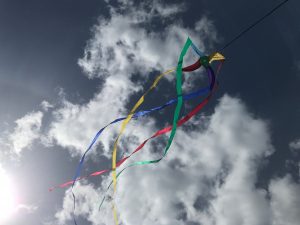Acts 2:1-21
The disciples have been on a roller coaster journey, as you may remember from last week. They experienced the excitement of following Jesus, and the devastation of his crucifixion, the fear and hope of his resurrection, and the strange surprise of his ascension. They have been through a lot. And after Jesus’ ascension, after he rises up to heaven, the disciples go back to Jerusalem, to wait for the fulfillment of God’s promise. They wait for power to come down to them from on high.
They wait. We forget, I think, that the disciples didn’t do much between Easter and Pentecost. Easter wasn’t a big party. The disciples didn’t leap into action and begin a ministry once the resurrection news reached them. Instead, the disciples mostly wait around for 50 days. They try to adjust their minds to everything that has happened. They try to figure out what all these events mean. They try to decide what to do next.
Then, finally, the day of Pentecost arrives. The disciples are huddled indoors. Outside, the festival of Shavout, the giving of the law, is being celebrated. Then a violent wind begins, and tongues of fire descend on the disciples. They begin to speak about the powerful acts of God in many languages. And Peter realizes that this is the fulfillment of a prophesy: that all people, women and men, old and young, rich and poor, will be filled with the Spirit. Peter gives a fantastic sermon, and thousands of people are baptized and start a Jesus-following community.
Pentecost changes everything. The waiting period is over. Suddenly, the disciples are filled with energy and purpose. They begin to act: to speak, to share, to heal. They begin to be church for one another and for the world.
Now we find ourselves here, 2,000 years after Pentecost. And we have had our own strange events to take in. These are really bewildering and challenging times. So much is happening, so many surprising and disturbing and world-changing events are happening. I don’t know about you, but I have to brace myself these days to even read the news, and decide carefully when and how I should read it. It is hard to take it in.
What are some of the surprising or troubling things that have happened recently? (The congregation mentioned events in Oregon, Kabul, and London; the U.S. departure from the Paris Climate Accord; an increase in deportations; laws proposed that do not protect the health and hunger of all). Events closer to home may be challenging us, too: changes in our church building, personal losses, even joyful transitions can take a toll.
It’s a lot. It’s so much, that we may need a little time to take things in. We may need a little lag time, to adjust to our new world, personal and national and global.
But once we have taken that time… what do we do next? What does it mean to be faithful people in this moment?
The Pentecost story can help us here. It gives us important messages about what God is all about, and what God asks us to do with the gift of our lives. These messages may not be new, exactly — you’ve heard them in church before — but when we are overwhelmed it is even more important than usual to remind ourselves of them.
In the Pentecost story, we encounter God in nature. We can perceive God’s Spirit because of natural forces. God reaches the people on Pentecost with wind and with flame. The very air is alive with God in this story.
Nature is very close to us, and close to God, in this story. And we should also notice that we are very close to one another. God doesn’t intend God’s gifts for only one person, or only one people. Instead, God’s power acts instead as a kind of connective tissue, putting people into contact with each other who may never have been able to communicate before.
God’s Spirit creates a magnificent web of energy that ties everyone together. People speak to one another across differences in language and nation and culture, and hear one another as if they were being spoken to in their own native tongue. God’s spirit fills all flesh – all genders, all ages. Even slaves, or servants, those at the very bottom of society, are filled by the Holy spirit with visions and dreams and they prophesy.
If we are paralyzed by the enormity of our human challenges, God has the perfect antidote: connection. Through God, with God, in God, creation is one, humanity is one. We are drawn together by the Spirit in one glorious diversity. We are aflame with energy, crackling with possibility, alive and full of imagination and love.
Pentecost is our story. This is our earth. These are our ancestors. This is our God. All we need to do is plug into the network. We have to keep remembering – every day, every week – who we are, and whose we are, and what we are called to do, and who we are called to do it with.
We are called to be God’s church: profoundly connected across all human boundaries of difference. We are called to be God’s church: profoundly connected to the earth itself. We are called to be God’s church: people who do not rely on our own power but on the power of God herself, a power that comes to clothe us from on high.
God gives us power as we meet the great challenges of this day. That power is not the power of military might or financial dominance or white supremacy. That power is strange and creative and surprising and even revolutionary. It brings courage and delight. Playfulness and abandon. Boldness and humility. That is the power that will allow us to move into faithful action. Thanks be to God.
